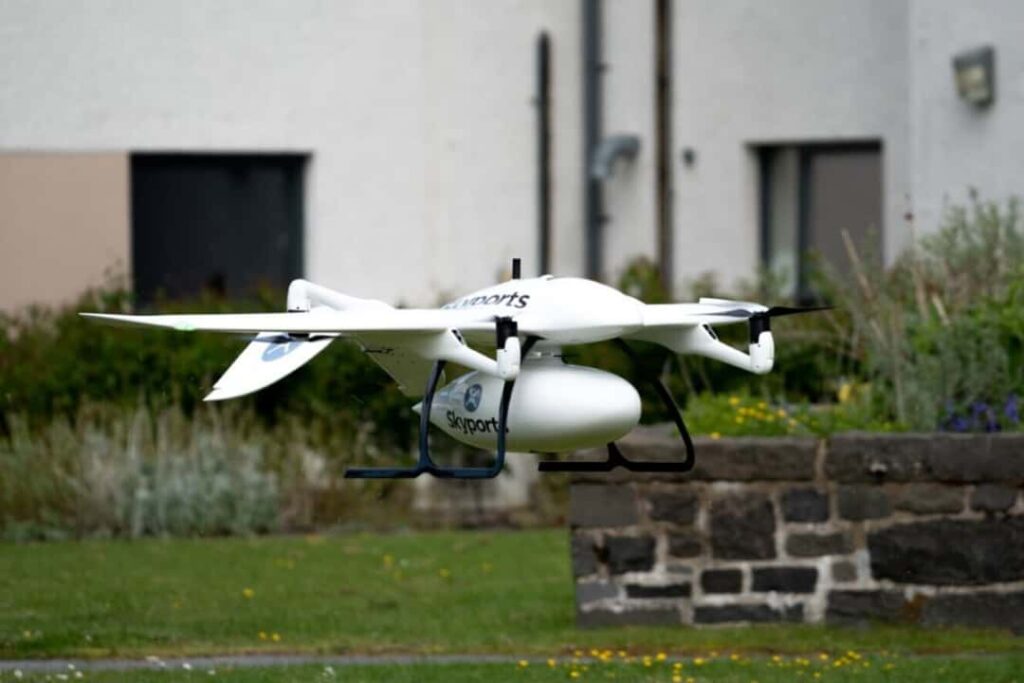
Thales has partnered with drone delivery provider Skyports and UAV manufacturer Wingcopter to trial the delivery of urgent medical cargo, such as COVID-19 test kits and Personal Protective Equipment (PPE), between remote medical facilities in Scotland by drone. The trial is backed by Argyll and Bute Health and Social Care Partnership (HSCP), part of NHS Highland.
Skyports will conduct the trial and operate the flights using Wingcopter’s delivery drones, which have already been proven through numerous delivery operations around the world. These trial flights will be planned through Thales’s operations management platform, SOARIZON, which offers digital tools to maintain compliant and safe drone flying operations.
The trial will consist of two-way flights between Lorn and Islands Hospital in Oban, and Mull and Iona Community Hospital in Craignure 10 miles (16km) away on the Isle of Mull. As COVID-19 testing rapidly gathers pace in the UK, the proposed delivery service will help to ensure that isolated communities have efficient and timely access to tests. Currently, the majority of medical supplies and specimens are transported between the laboratory at Lorn and Islands Hospital and surrounding general practitioners’ surgeries and other healthcare settings by sea and road, a long and complicated journey.
This service will see delivery times cut from up to 6 hours one-way by ground transport and ferry to around 15 minutes, on-demand, by drone, bringing considerable savings in terms of time and resource cost, as well as increasing safety for front line medical and delivery personnel.
This two-week trial represents a crucial milestone for unmanned aviation in the UK. Under current rules, unmanned aircraft must always be flown within visual line of sight of the remote pilot. To undertake these beyond visual line of sight (BVLOS) drone flights, the project team has been in close consultation with the CAA.
The trial aims to prove the long-term, sustainable viability of BVLOS services, bringing together regulation, government and industry to unlock the potential of drones for society when used in a safe, secure and controlled way. Thales and Skyports are also working together within the CAA Regulatory Sandbox programme, exploring how regulatory approvals can be granted for more widespread BVLOS drone operations in the UK.
Once the trial has been successfully completed, the team will continue to work closely with the CAA and the NHS to make similar services available elsewhere in Scotland and across the UK to a wide range of organisations, in particular a number of other NHS Boards and Trusts.
Alex Cresswell, CEO of Thales UK, said: “Thales’s technologies are playing a crucial part in the response to COVID-19 – both globally and here in the UK. This trial demonstrates the positive role that unmanned technology can play in our society and represents a landmark step to accelerate its adoption. We look forward to continuing to work collaboratively with industry partners, regulators and government to establish the UK as a world leader in this exciting new industry.”
Duncan Walker, CEO of Skyports, commented: “Delivery drones are a fast and reliable solution for vital medical supplies. Skyports is proud to assist the NHS in Scotland with their COVID-19 response, helping to provide the essential healthcare that people need in harder-to-reach areas. Our trial in Argyll and Bute provides an important short-term response to the current pandemic and lays the foundations from which to grow a permanent drone delivery operation across a network of healthcare facilities around the country.”
Joanna Macdonald, Chief Officer for Argyll and Bute Health and Social Care Partnership, stated: “I am delighted that Argyll and Bute Health and Social Care Partnership is again at the forefront in Scotland using new technologies to benefit our patients. The use of drones provides real opportunities to improve services and will help enable quicker diagnosis for our patients.”
Innovation Minister Ivan McKee said: “I am delighted that this trial will help deliver critical NHS supplies of PPE and testing kits to our island communities quickly and safely. This trial shows once again that innovation is key to finding new ways to deliver vital equipment and services to people. It also builds on our significant innovation investment and will help us to ensure Scotland becomes a destination of choice for the development, testing and deployment of robotics and autonomous technologies like drones.”


















